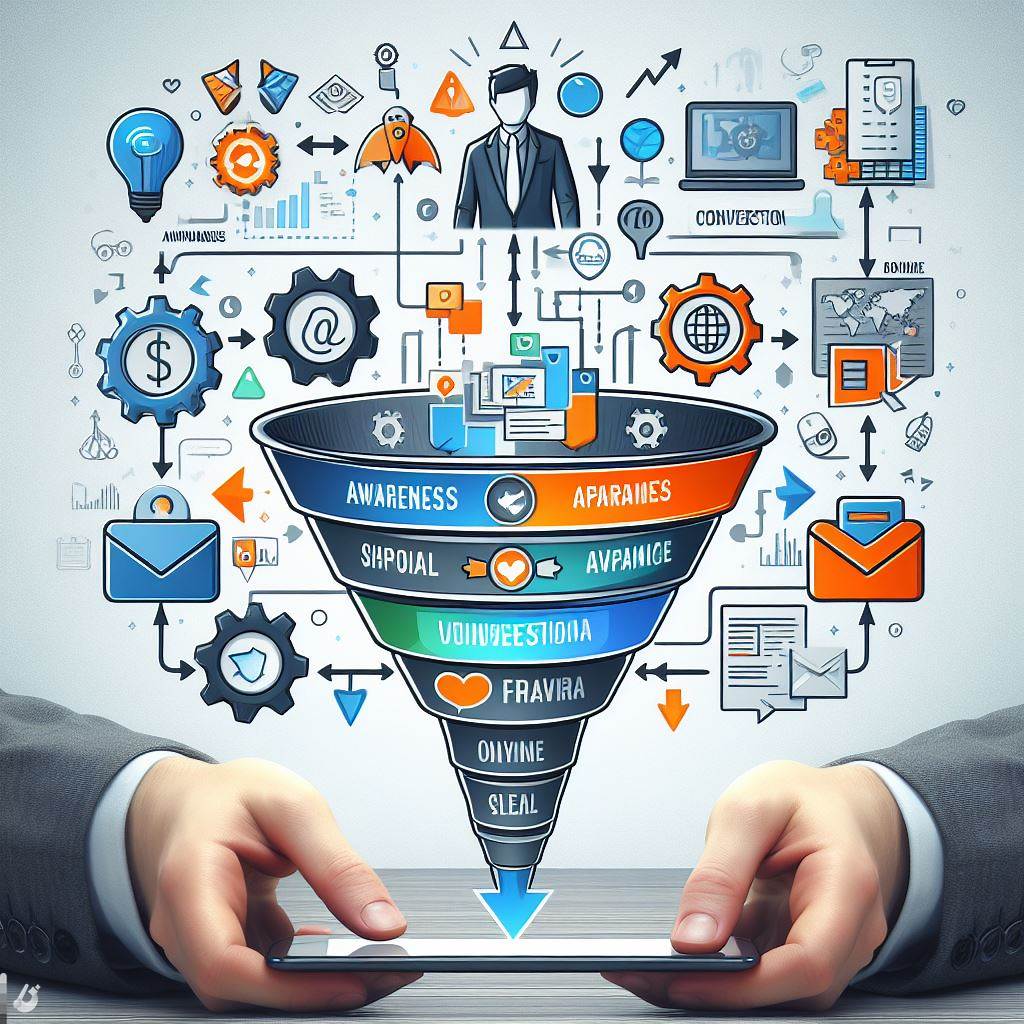In the vibrant marketplace of the digital age, attention is currency. Capturing it, however, is only the first step. Converting fleeting interest into loyal customers requires a strategic journey, a meticulously crafted path that guides prospects from awareness to conversion: the online lead funnel.
Table of Contents

Understanding the Stages of the Funnel
Imagine a funnel, wide at the top and narrowing towards the bottom. Your online lead funnel mirrors this image, with each stage representing a step in the buyer’s journey:
1. Awareness: At the top, the widest part of the funnel, your goal is to grab attention and generate interest. Think blog posts, social media content, and search engine optimization (SEO) to attract prospects who might have a problem your product or service solves.
2. Interest: Here, you pique curiosity and nurture the budding interest. Ebooks, webinars, and free consultations can provide valuable insights while subtly showcasing your expertise.
3. Consideration: The prospect weighs their options. Case studies, product demos, and testimonials can solidify your position as the preferred solution.
4. Decision: The narrow end of the funnel, where the prospect is primed to convert. Free trials, limited-time offers, and strong calls to action (CTAs) can nudge them towards purchase.
5. Delight: Remember, the journey doesn’t end with a sale. Post-purchase emails, loyalty programs, and exceptional customer service turn customers into brand advocates, widening the top of your funnel for future prospects.
Building Your Conversion Machine:
1. Define Your Ideal Customer:
Before crafting your funnel, understand who you’re targeting. Create detailed buyer personas outlining their demographics, pain points, and online behavior. This laser focus ensures your content resonates at every stage.
2. Craft Irresistible Lead Magnets:
Freebies like ebooks, cheat sheets, or webinars act as incentives for prospects to enter your funnel. Make sure these magnets are relevant to your target audience and offer genuine value.
3. Design Landing Pages that Convert:
Your landing pages are the gateways to your funnel. They should be visually appealing, informative, and laser-focused on a single CTA. Optimize for mobile responsiveness and ensure a seamless user experience.
4. Leverage Targeted Traffic:
Organic SEO, social media marketing, and paid advertising can drive traffic to your funnel. Tailor your approach to each platform, targeting the right audience with relevant messages.
5. Nurture Leads with Automation:
Email marketing automation sequences can keep your brand in the prospect’s mind without requiring constant manual effort. Personalized emails based on their behavior and interests nurture leads and move them down the funnel.
6. Analyze and Optimize:
Data is your friend. Use website analytics tools to track traffic, conversions, and engagement at each stage. Identify bottlenecks and test different elements to continuously improve your funnel’s performance.
Essential Tools for Funnel Management:
A robust toolbox makes managing your funnel a breeze. Consider these options:
- Landing page builders: Simplify landing page creation with tools like Unbounce or Leadpages.
- Email marketing platforms: Mailchimp, ActiveCampaign, and ConvertKit can automate your email sequences.
- Customer relationship management (CRM) systems: Salesforce, HubSpot, and Zoho CRM help you organize and track lead data.
- Analytics platforms: Google Analytics and Similarweb provide valuable insights into website traffic and user behavior.
Remember: Building a successful online lead funnel is an ongoing process. Experiment, test, and refine your approach based on data and customer feedback. With dedication and the right tools, you can transform fleeting interest into a steady stream of loyal customers, fueling the growth of your business.
Bonus Tips:
- Personalize the experience: Tailor your content and communication to each lead’s stage in the funnel.
- Focus on building trust: Transparency and authenticity are key to converting prospects into customers.
- Mobile-first approach: Ensure your funnel is optimized for the mobile experience, where most web browsing happens.
- Invest in paid advertising: Strategic ad campaigns can target your ideal audience and accelerate lead generation.
- Continuously learn and adapt: Stay updated on the latest marketing trends and adapt your funnel accordingly.
By following these steps and leveraging the available tools, you can craft an online lead funnel that becomes a powerful engine for your business, attracting, nurturing, and converting prospects into loyal customers. So, what are you waiting for? Start building your funnel today and watch your business soar!
Discover more from TechResider Submit AI Tool
Subscribe to get the latest posts sent to your email.



